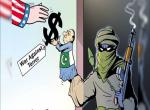The definition of terrorism eludes nation states in the larger international system. It is a rather arcane and perplexing situation in which the big and small nation states have not wholeheartedly attempted to decipher a globally recognized Coda for delineating the fundamentals and deleterious ramifications of the global vortex of terror, terror modules, harbouring states and the larger ensconcing rubric of the tentacled and warped ideology. Since taking over as Prime Minister in May 2014, Narendra Modi, has dexterously and religiously attempted to define and record international terrorism. But a universal definition still eludes the world.
In public utterances, Al Qaeda, has pinpointed the hallowed portals of the United Nations as a key obstacle to its aims and objectives to render asunder the peacenik cavalcade of mankind. The legal minefield of defining terrorism is not such a dangerous stream of effort that it can be said that, “Nations such as India intend to move where no men has gone before” in the true celluloid semblance of a surreal effort. Still, the U N informs us that, “Terrorism attacks the values that lie at the Heart of United Nations : respect for human rights, the rule of law, rules of war that protect civilians, tolerance amongst people and nations and the all significant and singularly pristine criterion of the peaceful resolution of conflict.” The UN further informs that: The Secretary General should take the lead role in strengthening responsible states, rule of law and incorporates an approach which includes a larger solution to the problem of global terror other than an instrumentality of bland coercion. Several anti-terrorist conventions have laid the normative foundation for defining terror. Within three months after the September 11 attacks, around 112 million dollars in alleged terror funds were confiscated while in the next three years only 24 million dollars could be seized from the terror funding chain. Thus, the whole idiom of mitigating and adapting to terror could not be realized effectively. Also, the depository mechanism of inviting annual reports from member nations as to the measures of countering terror modules in individual nations, could not be functionally realized.
Various developing nations could not make it practically contingent upon the myriad developed and western nations to release terror fighting technologies and larger functionalities to curb individual terror agents in their respective jurisdictions.
While efforts at defining terrorism have been afoot since the Comprehensive Convention on Terrorism in 2001, the entire nomenclature striving reached an impasse because of a few divergent comprehensions of the nature and tenor of “actuals of terror”. A rather warped insight which has been doing the rounds in the nation is that terror structures are constructed only and singularly by localized factors of marginalization and exclusion of populations, some of which happen to be numerical minorities in a nation and a society. The counter and kosher appellation is that the scourge of terror is a global issue which militates against the fundamental tenets of humanism and integrity of peace and stolidity in a nation and a society. Thus, some of the nations as part of a warped narrative, have, adhered to the notion of compartmentalizing the idiom of terror and its impact as being consequent of localized and domestic mal-governance only, devoid of exogenous conditions such as globalization, financing and communication and global agents such as ISIS and Al Qaeda. Thus, this is the rider which New Delhi, ought to remove from the strategic comprehension of some of the impacted nations, their mandarins and populations. PM Narendra Modi, too, has raised the all-pertinent issue of coalescing globally with victim nations and forge together a “Culture of Global Commons” or an effective and all encompassing global regime of Counter-terror similar to a Climate change, Disarmament and a Tariff-trade Regime in the truly cooperative international context.
Rosalyn Higgins, a western scholar contends that, “Terrorism is a term without legal significance. It is merely a convenient way of alluding to activities, whether of States or of individuals, widely disapproved of and in which either the methods used are unlawful or the targets projected, or both.”The question mark which other international lawyers such as Richard Baxter place before the efforts at defining terrorism as a legal concept should be delved inside with a different touch. The poser which the Indian governmental denomination has raised, is, that why cannot the scourge of terror be conceptualized as a legal concept rather than, alluding it repeatedly to the straigh jacket of criminal offences. This approach is tantamount to a soft pedaling on the issue of terrorism and as an impediment to the efforts at creating a “global commons” against terror.
The Indian standpoint on the terror spectacle has been very bright and positive. Prime Minister Narendra Modi expressed his displeasure at the want of determination and intent at the United Nations. He was addressing a group of expatriates at Brussels on 31 March 2016 when he declared the want of functionality on the part of the United Nations portals to explicate upon the notion of who is a terrorist nation state, which are the harbourers and what are the financial instrumentalities of terror financing? He blamed the grand International organization for its benign neglect referring to an all condemning terror defining resolution at the heady portals of United Nations preferably the horse shoe table chamber.
The Prime Minister proclaimed under strident applause that such a global organization has a well defined conceptual framework for war, conflict resolution and the various treaty mechanisms, but, the understanding on plane jane terrorism is missing. This might be construed as an exercise in Public Diplomacy but that is exactly how the murmurings of a nation bedeviled by the menace of terrorism can be amply and objectively expressed. The Hindustan Times even reported on March 31, 2016 that United Nations had to make strivings to define terrorism otherwise the apogee International Organization runs the risk of becoming irrelevant in the conflict strewn, partisan and shifting sands of the dragnets of self-determination and other attendant and myriad notions of sovereignty and Azaadi.
Immediately after the attack on the World Trade Towers, the idiom of Terrorism was amplified at the highest pitch by its self flagellating amplificatory pitch and why to blame the Americans for their GWOT only? The UNSC resolution no 1373 created the all important Counter Terrorism Committee ( CTC) which reaffirmed its resolutions of 1269 in 1999 and 1368 (2001) of 12 September 2001 which too took up novae cudgels against the global, lethal and surreptitious nature of the terror spectacle. The resolution was special in the reference to the armed clause that there existed an innate right for an individual nation state or a collectivity of nation states for collective Defense in accordance with the UNSC resolution no. 1368.
In the contemporary context, the UNSC has unanimously adopted the Resolution no.2254, endorsing a road map for Peace process in Syria and setting timetable for talks which have failed in the context of 2016. But, antagonist nations such as United States and Russia have been welded together in some semblance of an alliance to tackle the strife between Bashar Al Assad and the likes of opposition such as Al-Nusra Front and Al Qaeda. Consensus and the independence of the Syrian people to devise their own future once the conflict peters off. As a related contemporary development, the Asian Pivot of terror has been reinstated in the Holey Artisan Bakery of Dhaka where the victims who were not able to recite portions of a religious text were terminated mercilessly. Also, this bears stark similarity with the Boko Haram militants who in a mall hostage ‘event’ in Nigeria, made a lady victim talk to her parents and then let the parents hear the shot shots of her termination and then disconnected the phone after she had perished in a pool of blood. The “eventish” nature of the terror attack at “uppity” Dhaka restaurant is a stark reminder of the fact that South Asia’s ensconced and relatively untouched corners too will fall a prey to the terror antics, if, the individual Governments do not weld together in a Global Regime to counteract terror.
In the same connexion, India stands to gain a great deal by advancing the draft Comprehensive Convention on International Terrorism, despite voices being raised in the contrarian nature. PM Modi has once again reiterated the need for the Convention in the light of the spreading tentacles of the dread of ISIS at India’s doorstep in the context of the Holey Bakery profligacy. India had proposed a draft of such a convention as far back as 1996 and it can be advanced as a factoid that member states of CCIT should be bound by the contents of the operative paragraphs of the UNSC resolution 1373 of 2001. Thus, India stands justified in the light of the Dhaka “terror event” to vouch for a holistic and a collective approach in order to engender a globally applicable legal approach to tackle terror in all its apparitions and manifestations. The Regime complex as a solution to global quagmires such as Climate change inundations, Disarmament power brawls and others exist, so such a pan global approach and legal instrumentality to meet the terror challenge is naturally the need of the hour. Also, in the light of the Iraqi forces and the American UAV’s humbling ISIS in Fallujah and other territories in the first setbacks to ISIS in Iraq, the time might be ripe to “intensify the Institutional torque against terror with New Delhi taking the lead.”
(The author is Faculty, International Relations and International Administration, Indian Institute of Public Administration, New Delhi)
Published Date: 8th August 2016, Image Source: https://en.wikipedia.org
(Disclaimer: The views and opinions expressed in this article are those of the author and do not necessarily reflect the official policy or position of the Vivekananda International Foundation)










Post new comment